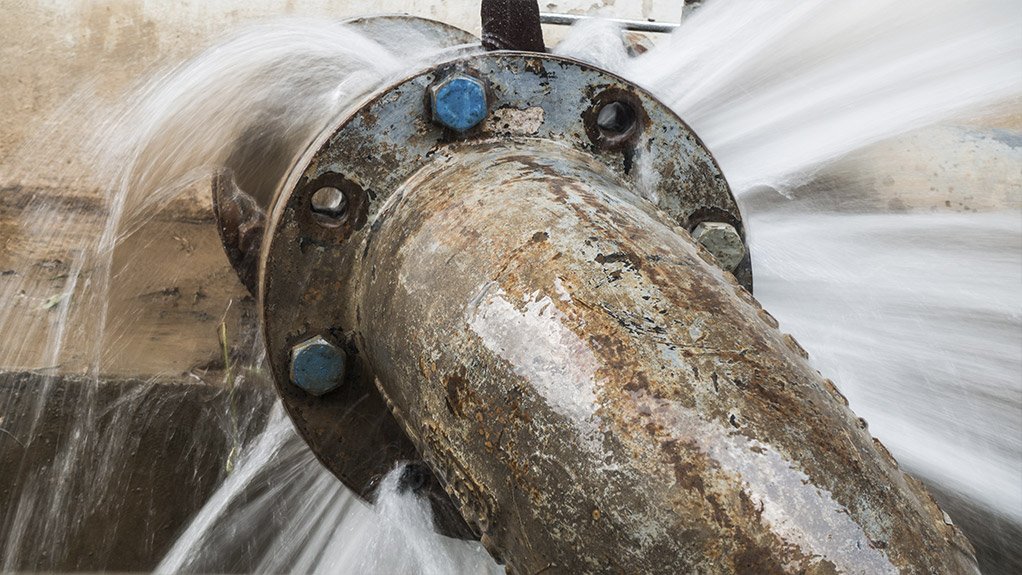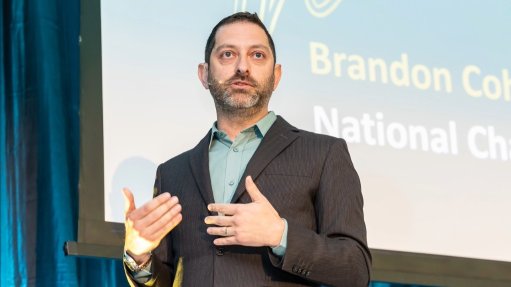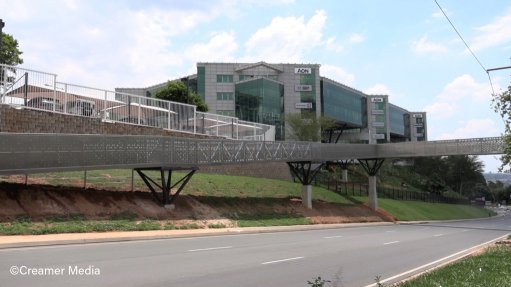Strategic Water Partnerships Network joins forces with Johannesburg Water to reduce consumption
To help reduce water consumption in Johannesburg by a targeted 37 123 megalitres a year, as well as narrow the current 31% water loss rate in the city, the Strategic Water Partnerships Network (SWPN) has partnered with municipal entity Johannesburg Water (JW).
The partnership comes as JW struggles to keep pace with infrastructure repairs and has left many parts of Johannesburg without water for days, citing budget constraints as the main reason behind backlogged maintenance.
SWPN, which is hosted by the New Partnership for Africa’s Development (Nepad) Business Foundation, will help JW determine best value for money projects, support communication efforts to reduce water consumption, help with project management support and reduce the current leak repair backlog, as well as equip and commission emergency boreholes and upgrade booster pump stations.
JW COO Derrick Kgwale says that, of the roughly 185 km of pipes a year that need to be replaced in the city, the entity is only able to replace 117 km over a five-year period.
JW has infrastructure assets with a current replacement cost totalling R115-billion, which have a renewal rate of 2% a year as a requirement. However, current expenditure patterns indicate an average renewal rate of 0.92% is being achieved with current funding allocations.
JW manages a 12 500 km network of water pipes, and just under 12 000 km of sewer pipes. Johannesburg’s average daily water demand is 1 621 megalitres, which it supplies through 75 pump stations and 129 reservoirs and towers, while the city treats 909 megalitres of sewage a day, through six wastewater treatment plants.
JW set out in 2016 to reduce water demand and invest in alternative water sources and tools for water conservation, through its Water Conservation and Water Demand Management strategy, however, Kgwale highlights that infrastructure deterioration is occurring at a faster rate than the city can invest in.
Kgwale confirms that JW is progressing the rollout of prepaid water meters in the city, particularly in townships, since these areas have a deep culture of nonpayment of water bills. However, he says JW offers to fix households’ plumbing issues before installing the meters, to avoid people paying excessive rates owing to leaks.
He points out that JW needs about R2.6-billion a year to effectively catch up with infrastructure maintenance; however, it has only been allocated R206-million in the 2023/24 budget and only generates an average R12-million of revenue a year.
Meanwhile, Nepad Business Foundation CEO Peter Varndell explains that the SWPN forms part of Nepad’s climate change mitigation activities, and aims to improve water security in the country, particularly as water supply is threatened through extreme weather events. Varndell points out that South Africa is already a water-scarce country.
SWPN, together with diversified miner Anglo American and beer brewer South African Breweries, has also partnered with the Polokwane municipality, in Limpopo, to reduce nonrevenue water and support water conservation in that city.
Particularly, SWPN has been tasked with providing project management, coordination and fund administration support in what the parties named the Polokwane Water Partnership.
The network aims to establish an operating model through the Polokwane Water Partnership and duplicate it across the country, including in Johannesburg, to help more municipalities manage water demand better.
In JW’s case, the network particularly targets improving billing and recovery rates and reducing water consumption in Johannesburg.
SWPN also has a partnership in place with the Nelson Mandela Bay municipality, in the Eastern Cape. The partnership has the backing and/or involvement of pharmaceuticals manufacturer Aspen, beverage manufacturers Coca-Cola Beverages South Africa and AB InBev, technology group Siemens and the Development Bank of Southern Africa.
SWPN has identified more potential collaborations, including with the municipalities of Harrismith, Mafube and Matjhabeng, in the Free State; Standerton, in Mpumalanga; Emfuleni, in Gauteng; and eThekwini and Escourt, in KwaZulu-Natal.
The Department of Water and Sanitation, in launching its No Drop Certification Programme in 2020 warned that South Africans would experience a growing gap between the volume of water that is available and the volume of water required, with the supply-demand deficit estimated to reach 17%, or 3.8-billion cubic metres, by 2030.
The No Drop Certification, which government launched to encourage water use efficiency and better nonrevenue water management in the municipal sector, means that a municipality is accomplished in its water conservation and demand management practices.
The SWPN has been instrumental in helping to develop the set of criteria that assesses and measures an organisation’s ability to render an acceptable service to its community.
Article Enquiry
Email Article
Save Article
Feedback
To advertise email advertising@creamermedia.co.za or click here
Comments
Press Office
Announcements
What's On
Subscribe to improve your user experience...
Option 1 (equivalent of R125 a month):
Receive a weekly copy of Creamer Media's Engineering News & Mining Weekly magazine
(print copy for those in South Africa and e-magazine for those outside of South Africa)
Receive daily email newsletters
Access to full search results
Access archive of magazine back copies
Access to Projects in Progress
Access to ONE Research Report of your choice in PDF format
Option 2 (equivalent of R375 a month):
All benefits from Option 1
PLUS
Access to Creamer Media's Research Channel Africa for ALL Research Reports, in PDF format, on various industrial and mining sectors
including Electricity; Water; Energy Transition; Hydrogen; Roads, Rail and Ports; Coal; Gold; Platinum; Battery Metals; etc.
Already a subscriber?
Forgotten your password?
Receive weekly copy of Creamer Media's Engineering News & Mining Weekly magazine (print copy for those in South Africa and e-magazine for those outside of South Africa)
➕
Recieve daily email newsletters
➕
Access to full search results
➕
Access archive of magazine back copies
➕
Access to Projects in Progress
➕
Access to ONE Research Report of your choice in PDF format
RESEARCH CHANNEL AFRICA
R4500 (equivalent of R375 a month)
SUBSCRIBEAll benefits from Option 1
➕
Access to Creamer Media's Research Channel Africa for ALL Research Reports on various industrial and mining sectors, in PDF format, including on:
Electricity
➕
Water
➕
Energy Transition
➕
Hydrogen
➕
Roads, Rail and Ports
➕
Coal
➕
Gold
➕
Platinum
➕
Battery Metals
➕
etc.
Receive all benefits from Option 1 or Option 2 delivered to numerous people at your company
➕
Multiple User names and Passwords for simultaneous log-ins
➕
Intranet integration access to all in your organisation

















